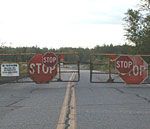Mining at the crossroads
By Bob Kelleher, Minnesota Public Radio
October, 2001
Minnesota mining is at a crossroads. A slump in the nation's steel industry has hammered the state's taconite producers. One Minnesota mine has closed, others have cut production and jobs. Now, fallout from the terror attacks threatens to push the industry, and the nation into recession.
On a still day, you can hear the drone of heavy trucks and loaders miles away. It's a welcome racket to residents of Hibbing, a city born to dig iron from hard, grey rock. More than 600 workers are back on the job at Hibbing Taconite. It's been a rough year for them. Two lengthy shutdowns have idled the mine and taconite plant for 13 weeks, a full quarter of the year.
But you might say they're the lucky ones. Twelve-hundred workers in northeast Minnesota mines lost their jobs in the last year, mostly due to the January closing of LTV Steel's iron mine and taconite plant near Hoyt Lakes.
The ghosts of the '80s are haunting the Iron Range. A steel crisis in that decade took more than half of Minnesota's iron mining jobs permanently. Some say the '80s are back.
"It's a lot worse right now than it has been," according to Steve Zeitler, communications director at Hibbing Taconite. "The situation that we went through in the '80s, we thought was very severe. Those were moderately good times compared to where we are now."
Minnesota's iron gets turned into taconite pellets, which feed the blast furnaces that produce raw steel. But the whole industry's mired in a long funk, led by low-cost foreign steel, multiplied by a year-long economic slowdown, and now threatened by terror-fueled recession. The bad times show up as red ink at the nation's steel companies.
"The number of bankruptcies, and the number of closures - permanent closures - and the number of temporary shutdowns and what have you, is greater now than it has been," according to Zeitler.
Nationwide, at least 18 steel companies had closed or filed for bankruptcy protection in the last four years, all before the events of September 11th.
Iron companies are banking on trade investigations now underway. Hearings in Minnesota this year focused on the steel industry's role in a strong national defense. Until recent events, it may have been a weak argument.
"A couple of weeks ago, I don't think too many of us were thinking about national security, but today, everyone's concerned," says Zeitler.
Yet, few think iron will benefit directly by a campaign against terror. It's not likely to generate a huge increase in the manufacture of steel products like tanks or ships.
The slowdown has exacted a heavy human toll in northern Minnesota. LTV Steel closed its Minnesota mine in January, National Steel Pellet Company in Keewatin and Evtac near Eveleth have trimmed their labor forces. Northshore Mining will suspend production at its Silver Bay taconite plant until December.
Yet, there's been little evidence of a stampede away from the Iron Range.
Dave Vesel has worked on and off at LTV since 1976. He thought his job operating LTV's heavy shovels and bulldozers was secure. "It was kind of a shock. Actually, it was a pretty big shock. We thought it was going to sold to another company, originally," he says.
Vesel's determined to stay, even though the jobs have left. He's launched his own business, building custom homes and additions, mostly for out-of-town residents' summer lake homes. So far, it hasn't produced the paychecks LTV had.
"Not this year. I took a big cut in pay this year, and a lot longer hours. But, I think it's worth it," he says.
But he's having a tough time starting a new business just as the economy slides. We're not on the downswing, and we're scrambling to find the work out there," says his wife, Diane. "We're competing with the other contractors who have been in the business for 10, 20 years. And it's a lot more difficult for us, being new to the picture."
And now, they worry about economic uncertainty and recession, which could hurt their core construction business.
The town of Biwabik is just down the road from the closed LTV gates. About 15 percent of the town's workforce lost their jobs at LTV. But it could have been worse.
City Planner Scott Dane says the range is more economically diverse than 10 years ago. New employers like Northwest Airlines' reservations center in Chisholm, and Delta Dental in Gilbert have brought hundreds of jobs with no connection to the iron industry. But the terror attacks of September 11 have hit airline jobs, while few of the new jobs provide the paychecks iron mining had.
"You may have made $20 an hour at one time, working in the mine. You may have to go to work for $10 to $15 an hour now, and the spouse may also have to go to work to remain living at the same standard that you enjoyed working in the mines," Dane says.
Dane remains optimistic despite the turn in world events. He says he has to keep focused on his mission, to strengthen Biwabik's job base despite the shadow of a looming national economic crisis.
Biwabik Mayor Steve Bradach says the range needs to turn to the future rather than rebuild its past. "The reality is mining is not what is was, 20nyears ago even," he says.
The industry is a lot leaner. There are over 4,000 miners left on the range today, compared to 16,000 in the late '70s. And some observers think that unless something dramatic happens, the industry's in terminal decline. Fifteen years ago there were 83 blast furnaces operating in the United States.
"Today there's 40 blast furnaces in the United States," Bradach notes. "The numbers are projecting eight less blast furnaces will be here over the course of the next 10 years. That hurts us. Taconite feeds those blast furnaces."
Industry insiders say there's going to be some role for blast furnaces for decades to come, but they're losing market share to a new kind of steel plant called a mini-mill. Minnesota mining companies are considering new facilities capable of creating a higher-grade iron product called, direct reduced Iron - DRI - that can be sold directly to mini-mills. But no projects are likely to materialize anytime soon.
Tony Barrett says the immediate prospects aren't good for northeast Minnesota. The College of St. Scholastica economist says it's not just the steel slump. He worries that the region's leading industries are vulnerable to economic slowdown. "Taconite, lumber, paper - all of those are going to go down if the economy goes down. Retail, by definition, slows, and that's another big thing here. The tourism hospitality will probably slow," according to Barrett.
But he says there is still hope that recession can be avoided, thanks in part to congressional response to the terrorist attack. "Congress has jumped ahead with increased spending, which is going to stimulate the economy. And to the extent that the economy is stimulated, that stimulates the demand for steel, which stimulates the demand for taconite."
In the short term, the Iron Range could also find relief in trade sanctions under consideration on foreign made steel products. In the long term, there's still hope for a billion-dollar steel plant on the western Iron Range. A number of firms are also looking into the possibility of new mines for Minnesota's other minerals, like platinum, palladium, and gold.
But big capital investments come slowly in the best of times, and these aren't the best of times.
By Bob Kelleher, Minnesota Public Radio
October, 2001
|
|
RealAudio |
Minnesota mining is at a crossroads. A slump in the nation's steel industry has hammered the state's taconite producers. One Minnesota mine has closed, others have cut production and jobs. Now, fallout from the terror attacks threatens to push the industry, and the nation into recession.
| |
|
|
|
||
But you might say they're the lucky ones. Twelve-hundred workers in northeast Minnesota mines lost their jobs in the last year, mostly due to the January closing of LTV Steel's iron mine and taconite plant near Hoyt Lakes.
The ghosts of the '80s are haunting the Iron Range. A steel crisis in that decade took more than half of Minnesota's iron mining jobs permanently. Some say the '80s are back.
"It's a lot worse right now than it has been," according to Steve Zeitler, communications director at Hibbing Taconite. "The situation that we went through in the '80s, we thought was very severe. Those were moderately good times compared to where we are now."
Minnesota's iron gets turned into taconite pellets, which feed the blast furnaces that produce raw steel. But the whole industry's mired in a long funk, led by low-cost foreign steel, multiplied by a year-long economic slowdown, and now threatened by terror-fueled recession. The bad times show up as red ink at the nation's steel companies.
"The number of bankruptcies, and the number of closures - permanent closures - and the number of temporary shutdowns and what have you, is greater now than it has been," according to Zeitler.
Nationwide, at least 18 steel companies had closed or filed for bankruptcy protection in the last four years, all before the events of September 11th.
Iron companies are banking on trade investigations now underway. Hearings in Minnesota this year focused on the steel industry's role in a strong national defense. Until recent events, it may have been a weak argument.
"A couple of weeks ago, I don't think too many of us were thinking about national security, but today, everyone's concerned," says Zeitler.
Yet, few think iron will benefit directly by a campaign against terror. It's not likely to generate a huge increase in the manufacture of steel products like tanks or ships.
| |
|
|
|
||
Yet, there's been little evidence of a stampede away from the Iron Range.
Dave Vesel has worked on and off at LTV since 1976. He thought his job operating LTV's heavy shovels and bulldozers was secure. "It was kind of a shock. Actually, it was a pretty big shock. We thought it was going to sold to another company, originally," he says.
Vesel's determined to stay, even though the jobs have left. He's launched his own business, building custom homes and additions, mostly for out-of-town residents' summer lake homes. So far, it hasn't produced the paychecks LTV had.
"Not this year. I took a big cut in pay this year, and a lot longer hours. But, I think it's worth it," he says.
But he's having a tough time starting a new business just as the economy slides. We're not on the downswing, and we're scrambling to find the work out there," says his wife, Diane. "We're competing with the other contractors who have been in the business for 10, 20 years. And it's a lot more difficult for us, being new to the picture."
And now, they worry about economic uncertainty and recession, which could hurt their core construction business.
The town of Biwabik is just down the road from the closed LTV gates. About 15 percent of the town's workforce lost their jobs at LTV. But it could have been worse.
City Planner Scott Dane says the range is more economically diverse than 10 years ago. New employers like Northwest Airlines' reservations center in Chisholm, and Delta Dental in Gilbert have brought hundreds of jobs with no connection to the iron industry. But the terror attacks of September 11 have hit airline jobs, while few of the new jobs provide the paychecks iron mining had.
"You may have made $20 an hour at one time, working in the mine. You may have to go to work for $10 to $15 an hour now, and the spouse may also have to go to work to remain living at the same standard that you enjoyed working in the mines," Dane says.
Dane remains optimistic despite the turn in world events. He says he has to keep focused on his mission, to strengthen Biwabik's job base despite the shadow of a looming national economic crisis.
Biwabik Mayor Steve Bradach says the range needs to turn to the future rather than rebuild its past. "The reality is mining is not what is was, 20nyears ago even," he says.
| |
|
|
|
||
"Today there's 40 blast furnaces in the United States," Bradach notes. "The numbers are projecting eight less blast furnaces will be here over the course of the next 10 years. That hurts us. Taconite feeds those blast furnaces."
Industry insiders say there's going to be some role for blast furnaces for decades to come, but they're losing market share to a new kind of steel plant called a mini-mill. Minnesota mining companies are considering new facilities capable of creating a higher-grade iron product called, direct reduced Iron - DRI - that can be sold directly to mini-mills. But no projects are likely to materialize anytime soon.
Tony Barrett says the immediate prospects aren't good for northeast Minnesota. The College of St. Scholastica economist says it's not just the steel slump. He worries that the region's leading industries are vulnerable to economic slowdown. "Taconite, lumber, paper - all of those are going to go down if the economy goes down. Retail, by definition, slows, and that's another big thing here. The tourism hospitality will probably slow," according to Barrett.
But he says there is still hope that recession can be avoided, thanks in part to congressional response to the terrorist attack. "Congress has jumped ahead with increased spending, which is going to stimulate the economy. And to the extent that the economy is stimulated, that stimulates the demand for steel, which stimulates the demand for taconite."
In the short term, the Iron Range could also find relief in trade sanctions under consideration on foreign made steel products. In the long term, there's still hope for a billion-dollar steel plant on the western Iron Range. A number of firms are also looking into the possibility of new mines for Minnesota's other minerals, like platinum, palladium, and gold.
But big capital investments come slowly in the best of times, and these aren't the best of times.



